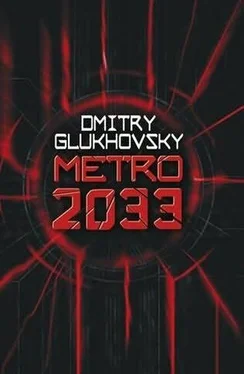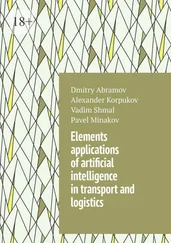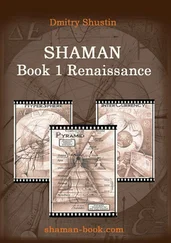The leadership of the Red Line had abandoned attempts to force the population of the whole metro to be happy by forcing Soviet power on them, and it had adopted a new doctrine which established communism along a separate line of the metro system. Though it had been unable to dispense with its original dream and continued to call the metro system the ‘V. I. Lenin Metropolitan’ it had taken no practical steps to pursue the grand plan for a while.
But despite the seemingly peaceful behaviour of the regime, its internal paranoid nature hadn’t changed at all. Hundreds of agents of the internal security service, like in the old days, with a certain nostalgia for the KGB, constantly and diligently watched the happy inhabitants of the Red Line, and their interest in guests from other lines was unending. Without the special permission of the management of the ‘Reds’ no one could get to any other station. And the constant monitoring of passports, the total watching and a general clinical suspicion was imposed on the accidental travellers as well as the spies who were sent there. The former were equated with the latter and the fate of both was rather sad. So there was no point in Artyom thinking about getting to Polis through three stations that belonged to the Red Line.
Generally there wasn’t an easy route into the very heart of the metro. To Polis… Just the mere mention of this name in a conversation made Artyom (and most others) fall into a reverential silence. He clearly remembered even now the first time he heard the word in a story told by one of his stepfather’s friends. Afterwards when the guest had left, he asked Sukhoi quietly what the word meant. His stepfather then looked at him carefully and, with a vague sadness in his voice, he said, ‘That, Artyom, is probably the last place on the earth where people live like people. Where they haven’t forgotten what the word “person” means, and, moreover, how the word should sound.’ His stepfather smiled sadly and added, ‘That is a City.’
Polis was located where four metro lines crossed, and it took up four stations all by itself: Alexander’s Garden, Arbatskaya, Borovitzskaya and the Lenin Library. That enormous territory was the last, genuine seat of civilization, the last place with such a large population that provincial types who happened upon it couldn’t help but call it a city. It was given a name – but it meant the same thing anyway: Polis. And perhaps it was because this word had a foreign ring to it, an echo of a powerful and marvellous ancient culture which seemed to protect the settlement, that the name stuck.
Polis remained a unique phenomenon in the metro. There, and only there, you could still meet the keepers of old and strange knowledge, which in this severe new world, with its disappearing laws, you just couldn’t find anymore. Knowledge for the inhabitants of almost all the other stations, and in essence for the whole metro, was slowly plunging into an abyss of chaos and ignorance, becoming useless along with those who carried it. Driven from everywhere, the only refuge they found was in Polis, where they were welcomed with open arms, because their colleagues were in power here. That’s why in Polis, and only in Polis, you could meet decrepit professors, who at some point worked in the departments of famous universities, which were now empty and in ruins, crawling with rats and mould. And the last remaining artists lived there too – the actors, the poets. The last physicists, chemists, biologists… Those who stored the best of man’s achievements in their skulls, and who knew a thousand years of history. Those whose knowledge would be lost when they died.
Polis was below what used to be the very centre of the city above. Right above Polis stood the building of Lenin’s Library – the most extensive storehouse of information to come from all ages. There were hundreds of thousands of books in dozens of languages, covering probably all the areas in which human thought was directed. There were hundreds of tonnes of papers marked with all sorts of letters, signs, hieroglyphs, some of which no one could read anymore because the language had died with the last of their speakers. But the whole massive collection of books could still be read and understood, and the people who died a hundred years ago and who wrote them still had a lot to say to the living.
Of all the confederations, empires and powerful stations who had the means to send expeditions to the surface, only Polis sent stalkers up to get books. It was the only place where knowledge was valued so much that people were willing to risk the lives of their volunteers for the sake of books, to pay enormous sums to those they hired to do it and forego material assets for the sake of acquiring spiritual assets.
And, despite the seeming impracticality and idealism of the administration, Polis stood strong year after year and troubles bypassed it. If any danger threatened it then the whole metro was ready to rally for its protection. The echoes of the last battle that took place there in living memory – between the Red Line and the Hansa – had died down and there was a magic aura of invulnerability and well-being surrounding Polis again.
And when Artyom thought about this wonderful city, it didn’t seem strange to him at all that the journey to such a place wouldn’t be easy. He would have to get lost, go through dangers and tests of strength, otherwise the purpose of the journey would have its charms wasted.
If the way through Kirovskaya along the Red Line to the Lenin Library seemed impenetrable and too risky, then he’d have to try overcoming the Hansa patrol and go along the Ring. Artyom peered into the charred map even more closely.
Now, if he could be successful in getting through the Hansa territory, by creating some sort of pretext, chatting to the guards at the cordons, breaking through with a fight or by some other means, then the trip to Polis would be short enough. Artyom pushed his finger into the map and drew it along the lines. If he went from Prospect Mir in the direction of the Ring, through the two stations that belonged to the Hansa, he would come out at Kurskaya. Then he could switch over to the Arbatsko-Pokrovsk line and from there he could get to Arbatskaya, which is to say, to Polis. True, Revolution Square was on the way, surrendered after the war to the Red Line in exchange for the Lenin Library, but the Reds guaranteed free transit to all travellers. This was one of the basic conditions of the peace agreement. And since Artyom was not planning on staying at that station but just going through it, he would ideally be let through freely. Having thought about it, he decided to stick with that plan and to try to iron out the details along the way about the stations he would have to pass through. If something didn’t work out, he said to himself, he could always find an alternative route. Looking at the interlacing lines of the numerous passages, Artyom thought that the commander went a bit too far in painting a picture of the difficulties of even the shortest trips through the metro. For example, you could get from Prospect Mir not from the right, but from the left – Artyom drew his finger down the map to the Ring – until you got to Kievskaya, and there you could go through a pedestrian passage to the Filevskaya line or the Arbatsko-Pokrovskoi line with just two stops to Polis. The task didn’t seem so impossible to Artyom anymore. This little exercise with the map had given him confidence in himself. Now he knew how to act, and no longer doubted that when the caravan got to Rizhskaya, he wouldn’t be returning with the group back to VDNKh but would go on with his journey to Polis.
‘Studying?’ Zhenya asked him having walked right up to Artyom without his noticing.
Artyom jumped up in surprise and tried to hide the map in his confusion.
Читать дальше











